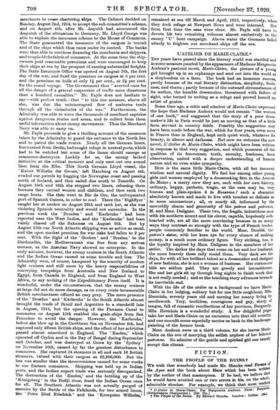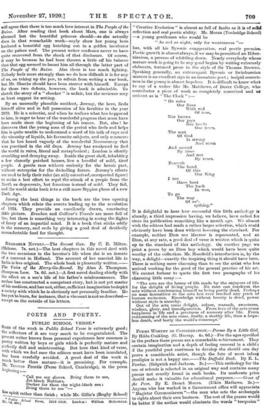F IC TI ON.
THE PEOPLE OF THE 111TINS.t
WA wish that somebody had made Mr. Shanks read Tarsas of the Apes and the book about Mara which has been written by the author of that masterpiece. If he bad, we believe that he would have avoided one or two errors in his, on the whole, admirable shocker. For example, we think that most made! • V Atelier do Morle-Ololre. Par Marguerite Audonz, Parte: Hanion'' (Bibilothegue Charpentter.) [5tr. 750.1 The People of the Ruins. By Edward Shanks. London: Collins. [914 will agree that there is too much love interest in The People of the Ruins. After reading that book about Mars, one is always alarmed lest the beautiful princess should—as she actually does in that remarkable work—coyly show her young hero husband a beautiful egg hatching out in a golden incubator on the palace roof. The present writer confesses never to have quite recovered from the shock of that disclosure. Of course, it may be because he had been thrown a little off his balance that that egg seemed to haunt him all through the latter part of The People of the Ruins. Also there is too much fighting. Nobody feels more strongly than we do how difficult it is for any of us, on taking up the per, to refrain from writing a war book, but Mr. Shanks should have been sterner with himself. Except for these two defects, however, the book is admirable. To sketch the story of a " shocker " is unfair, but the reviewer may at least suggest its setting.
By an unusually plausible accident, Jeremy, the hero, finds himself alive and in full possession of his faculties in the year 2070. He is a scientist, and when he realizes what has happened to him, is eager to hear of the wonderful progress that must have been made sinoe the beginning of his trance. But, alas ! he discovers that the young man of the period who finds and helps him is quite unable to understand a word of his talk of rays and the viscosity of liquids, his favourite subjects, and only murmura that he has heard vaguely of the wonderful Necromancy that was practised in the old days. Jeremy has awakened to Said the world in ruins, literal and metaphorical ; London is silently crumbling and decaying away. Inside the great shell, inhabiting a few clumsily patched houses, live a handful of mild, tired people. A gentle race without curiosity for the heroic past, nithout enterprise for the dwindling future. Jeremy's efforts arc used to help their ruler (an ably conceived, unexpected figure) to make a last effort to repel the attack of a people from the North as degenerate, but ferocious instead of mild. They fail, and the world sinks back into a dill more Stygian phase of a new Dark Age.
Among the best things in the book are the two opening chapters which relate the events leading up to the revolution of 1924. They provide an excellently drawn, convincing little picture. Erewhon and Gulliver's Travels are more full of tire, but there is something very interesting in seeing the flights of fancy of an impartial mind. It is a book that sticks oddly in the memory, and ends by giving a good deal of decidedly uncomfortable food for thought.







































 Previous page
Previous page